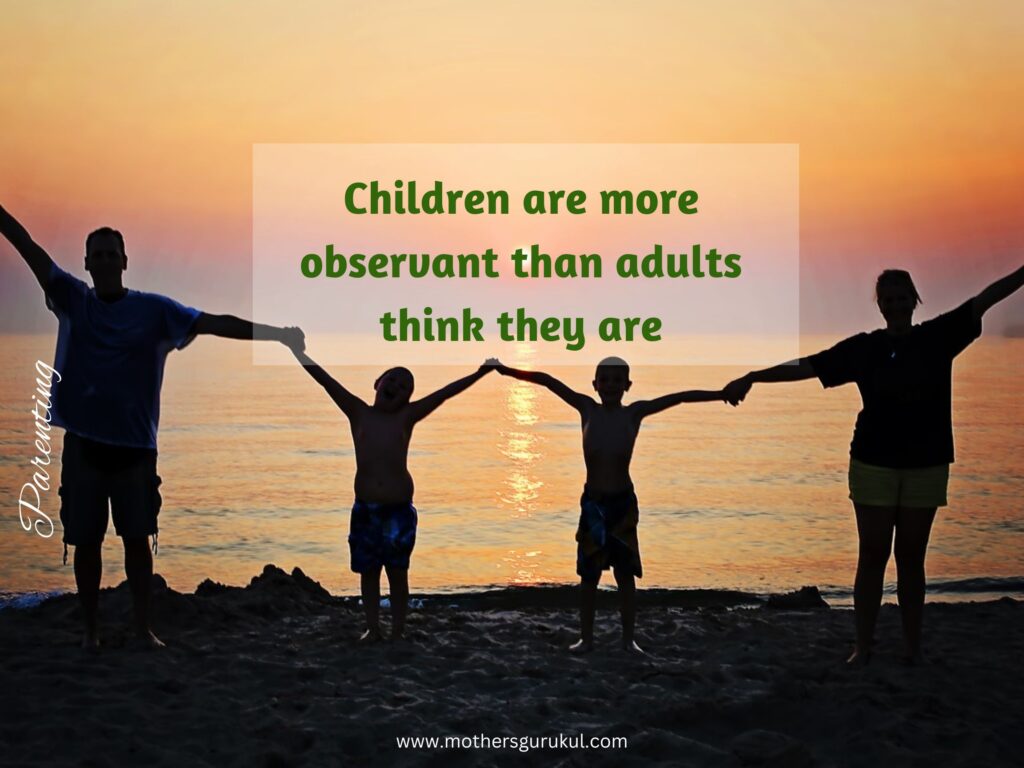We often hear people saying that girls have a natural motherly instinct; even their pretend plays have a caring touch. On the other hand, boys play rough. Now, where does this behavior come from? Are they born with these instincts or traits? Well, they imitate their parents since childhood. Girls see their moms in a nurturing role and dad as a superhero who will save them from any hardships. That’s what we see in their behavior, words, or plays. All this boils down to their basic nature. Kids, by nature, are curious and observant. Sometimes, we don’t even realize what is coming from our mouths, but they hear it. It is not just what we say to them directly, but how we talk to others about them and ourselves; how we react in certain situations, etc. Surprisingly, these are our day-to-day interactions and behaviors. I came up with these five things children can pick up that adults don’t realize.

Children are more observant than adults think they are…
- Discussing family matters in front of kids
- How you treat your partner
- What matters the most
- Self-image and self-talk
- Discussing your child with other parents
Discussing family matters in front of kids:
Every family has some pluses and minuses. But as parents, we should try to keep our kids away from them. When discussing any family member, we should be careful that our kids are not around. We don’t have to let them carry forward our baggage. When the time is right, they will unfold them on their own. As parents, our job is to teach them to respect their elders. But when we gossip or use wrong words about family members in front of our kids, it contributes a lot towards changing their perception from good to bad.
How you treat your partner:
Kids see their mom and dad as the first example of a couple. They see how their parents treat each other, what kind of words they use to describe each other, and how they talk about other parents. Now, what is this doing with their brain? Seeing their mom and dad talking to each other with love and respect creates a positive image of a couple’s relationship in their mind. Along with that, they make an image of other parents as well. When they grow old, they have this image of their partner. If they have seen a healthy relationship between their parents, they are confident that a home is made up of love, respect, and trust. And they will also try to follow the same. On the other hand, if a child has seen arguments, strong words or remarks, and judgmental behavior, they will grow up becoming a similar person.
What matters the most:
Let me ask you a question. When your child tells you about their grades, how do you react? Do you praise them and discuss their performance, or do you ask who scored the highest? Earlier, you told them that marks do not define you. Practice is the key. And now you are asking them about the highest grades. What does this say to the child about you, and what matters the most to you? Think.
Our kids take clues from the decisions we make, the words we use, and our reactions to certain situations. They put all this together and conclude what matters the most to us. The most common example is not telling a lie. Since childhood, we have told our kids to be truthful. And then they see us telling a lie (no matter how big or small, it is a lie). As adults, we say sometimes it’s okay to tell a lie. But think about it. How will they decide when it is OK to tell a lie and when it is not?
Self-image and self-talk:
Lately, self-image has become a crucial topic for all ages. We all want to look good and feel good. Right? If we get trapped in thoughts of negative self-image, we will have negative self-talk. Our kids see us treating ourselves with pity. Cribbing over how you have gone out of shape after having kids or how frustrated you are about not losing weight; you feel awkward going in public or meeting your friend circle will convey a message that we feel confidence is solely depends on our looks. On the other hand, when adults are polite and kind towards themselves, carry themselves with confidence, admit their mistakes, and respect others, it leaves a long-lasting impression on kids’ minds.
Discussing your child with other parents:
The kid’s behavior is not the same all the time. Sometimes, they behave like a decent and well-mannered kid, but other times, they show their moodiness. They act most weirdly. When it goes above our head, we discuss it with other parents. We feel that by discussing it with other parents, we can vent and seek suggestions. But sometimes, we talk to other parents in front of our kids. And I’m afraid that’s not right. It is natural for them to feel bad when we talk about how they are wrong with other parents or how other parents are lucky that their kids listen to them.
Final words,
New research shows that children may be better at noticing things most adults miss. So, next time you talk in front of kids, I hope you will keep these five points in mind.
